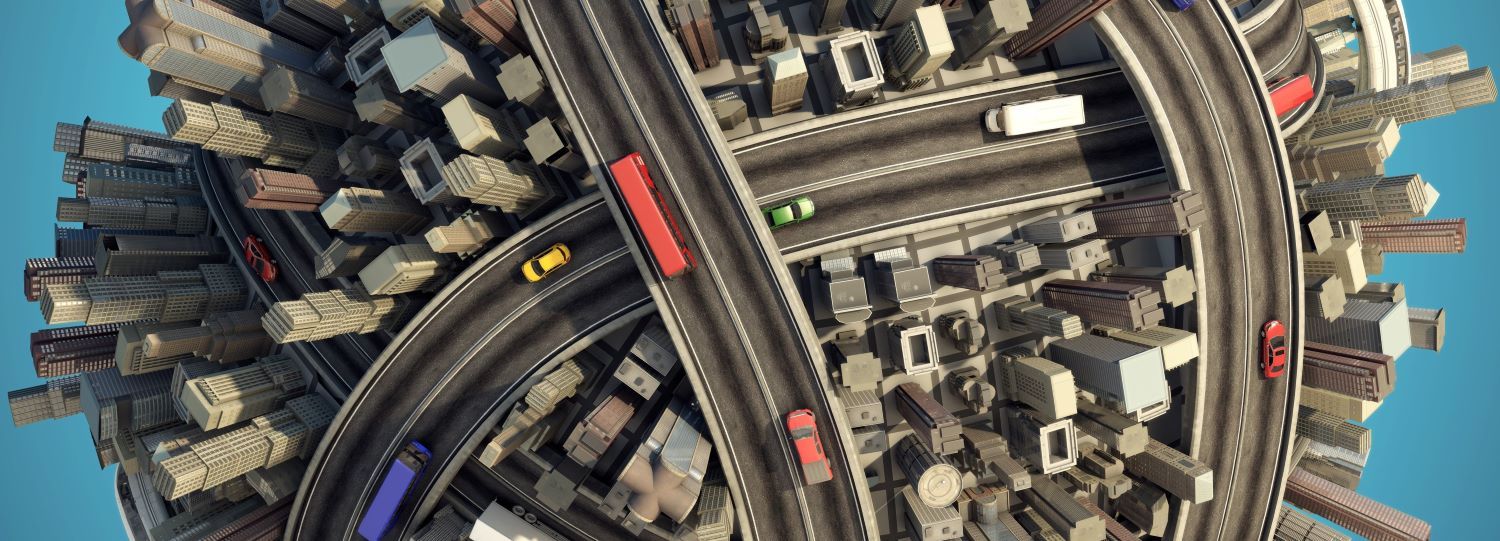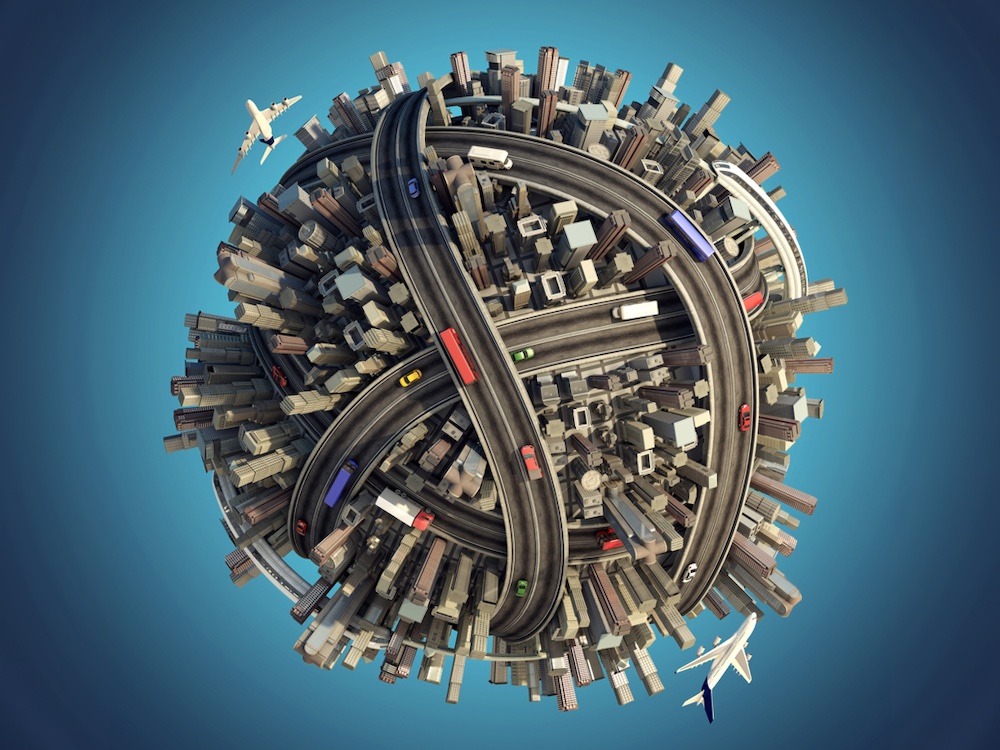“People will come to love their oppression, to adore the technologies that undo their capacities to think.” — Aldous Huxley
In the 19th century the Austrian geologist Eduard Suess hiked the Alps to study rock formations to better map the geological history of our world. Suess, one of the early fathers of ecology, was fond of saying that humans are prone to forget “that the planet may be measured by man, but not according to man.”
Suess also applied a new name to our planet. He called it the biosphere. And by that term he meant all the places on Earth that support life.
As a geological force the biosphere has existed for 3.5 billion years. It is full of wonders including forests that make oxygen and whales that sequester carbon in the ocean. It is complex, diverse and self-regulating. It also generates no waste and runs on free flows of energy primarily from the sun.
The great Ukrainian scientist Volodymyr Vernadsky fleshed out the concept: “In its life, its death and its decomposition an organism circulates its atoms through the biosphere over and over again.”
As animals, humans are the denizens of the biosphere. It is our mother ship. But in recent decades the biosphere has been eclipsed by an entirely human-made construct. This new artificial environment began to emerge sometime during the Industrial Revolution when humans employed coal and then oil to rework the world with machines. These machines now make and measure every imaginable thing. They do so according to their human designers and, increasingly, machines.
First came an eruption of cities, followed by roads, rails and planes to supply and connect them. More materials and technologies accumulated in rapid succession, accelerating like a sleek Italian sports car after the Second World War. By the end of the 1950s it became clear that humans had used stores of fossil energy to build something very distinct from the biosphere. This new entity not only cannibalized resources from a finite planet but posed a threat to its very existence with continuous streams of toxic waste from its machines.
John Milsum, a Canadian control engineer, gave this phenomenon a name in the 1960s. He called this new system, dependent on machines and machine thinking, the technosphere.
Why does so cold and metallic a word as technosphere define our present condition? What control do humans really have over this mega-construct of our own making? For each individual enmeshed, what can and should be our response?

A HUNGER TO BE SERVED
Today technology and its material demands have colonized every biological zone on Earth and shape virtually all human life. By definition the technosphere represents an artificial (and parasitic) offshoot of the much-abused biosphere. It includes glass, concrete, asphalt and plastic, roaring furnaces and humming digital paraphernalia. It includes motors, missiles, the internet and all the energy humans wrangle to power them. AI has already penetrated just about every economic activity.
Yet few people and even fewer leaders recognize where we’ve arrived. Technosphere residents, servants or inmates (you can pick the appropriate noun) remain largely blind to its size and intent.
Many people spend more time living in the technosphere than they do in the real world. They can identify the virtual characters of video games but cannot name the trees or birds outside their windows. The average U.S. teenager spends nearly eight hours on screens, floating like internet astronauts steered by algorithms. Their French counterparts have owned, on average, five mobile phones by the age of 18.
Peter Haff, a U.S. geoscientist at Duke University, has written extensively about the technosphere and its powers. In a fascinating 2013 paper he broadly defines this machine-mediated universe as an interlinked system of communication, transportation and administrative technologies that mines, metabolizes and consumes fossil fuels and any other energy sources it can draw upon.
With every tonne of fossil fuels the technosphere consumes, it extracts another six tonnes of material stuff including sand, metal, rock, wood and stone. “On land the technosphere,” writes Haff, “transports large quantities of solids further and faster than any natural process except sediment transport by rivers.”
As such the technosphere possesses its own metabolism, continuously appropriating resources like some Napoleonic army. Its fresh water demands alone divert the equivalent of a Mediterranean Sea every year.
The endless transformation of Earth wrought by the technosphere is, in Haff’s words, “an emerging geological process that has entrained humans as essential components that support its dynamics.” The word "component" is instructive. If a citizen or component doesn’t serve the technosphere, then they may well find themselves discarded or, as Haff explains, slated for repair.
“A few individuals may occasionally withdraw from the technosphere voluntarily to become hermits, or fail to work in its support because of mental or physical incapacity.... From the point of view of the technosphere the latter are broken parts, and are in effect discarded from the system unless they can be repaired, i.e. made serviceable again.”
As Haff notes, glimmers of the old world can still be found in a few scrubby hinterlands, but no refugia really exist. “In subduing the last vestiges of mass resistance to assimilation, the technosphere seems to be approaching, as if towards a mathematical limit, domination of 100 per cent of the world’s people,” he writes.
The biosphere pays a brutal price for technological progress by being cannibalized, fragmented, mined, deforested and polluted. And so do we.
The technosphere spews waste including pesticides, rock tailings, nitrogen, plastic, electronic gadgets, forever chemicals and volcanoes of carbon dioxide. It consumes and purges like wealthy Roman aristocrats at dinner.
Haff notes that the technosphere is a “poor recycler” of all the resources it appropriates. That is a vast understatement.
In 1900 the mass of human civilization equalled about three per cent of global biomass. Today the weight of the technosphere’s manufactured abundance exceeds that of all living things on the planet.
In 2020 a group of Israeli researchers calculated the mass of all living things in the biosphere to be 1.12 trillion tonnes. But in that same year the weight of the concrete, asphalt, glass, vehicles and plastic that make up the technosphere surpassed the living world. It clocked in at 1.15 trillion tonnes.
The planet’s animals collectively weigh approximately four gigatonnes, but plastics now total eight gigatonnes. Buildings and infrastructure including roads represent a larger mass than all of the world’s trees and shrubs. If megacities continue to expand and human societies consume more and more finite stuff, the mass of the technosphere, including its leviathan waste stream, will exceed three teratonnes by 2040. That is almost triple the dry biomass on Earth.
“There’s now enough concrete on the planet to produce a 2mm thick, full-scale replica of Earth, and enough plastic to completely wrap that replica in cling film,” wrote natural scientists Gabrielle Hecht and Pamila Gupta six years ago.

CRITICS AND BOOSTERS
At different times thinkers have called the expanding technosphere by various names. In the 1930s urbanist Lewis Mumford talked about the rise of the “megamachine” and considered it a death force while novelist Aldous Huxley called it the Brave New World. Social critic Neil Postman called it Technopoly in 1992, and ecologist Nate Hagens refers to “the Superorganism.” A group of modern geologists speak of “the Anthropocene” or the age of sapiens.
The most perceptive and prophetic of these critics was Jacques Ellul. In the 1950s, just as the technosphere was accelerating as a global geological force, Ellul wrote The Technological Society. He warned that technology and its cult would homogenize all cultures, neuter faith, centralize power, dominate all economic and political affairs and replace natural landscapes with artificial, sterile environments.
Ellul predicted that there could be only one solution to every problem in a technological society: the application of more technique in the name of efficiency. And that the rising cult of efficiency would banish ideals such as beauty, truth and virtue.
Every innovation, of course, comes with a raft of unintended effects. Ellul warned that if technology kept growing, “then disorder will keep growing and the more disorder increases, the greater our fundamental danger.”
The disorder and danger facing the biosphere and we who depend upon it are, as Ellul predicted, fundamental. In what scientists call the sixth mass extinction, plants and animals are dying due to the appropriation of habitats and water by the technosphere and its eight billion human components.
Scientists estimate that at least one million species of plants and animals face extinction in the coming decades. About half of the departed will be insects. Vertebrate populations have already decreased by 60 per cent since 1970.
The technosphere has similarly assaulted and changed humanity, fragmenting our thinking and killing attention spans. Social media has eroded democracies and polarized political debate. As humans increasingly talk more and more to machines, social epidemics of anxiety and loneliness worsen.
Yet the techno-optimists claim that an app will soon appear to address these challenges of escalating alienation. For to date the technosphere has far more advocates than critics. The boosterism preached by the digerati and political class is amplified by complicit media, which rarely acknowledge there should be limits to growth and therefore our own consumptive behaviours. Techno-optimists champion constant disruption, dream of melding with machines and even seek to defeat death. They want us to consider robots our friends. And they swear more technology will salve the wounds of previous technological assaults.
A recent Silicon Valley manifesto reads like a religious exaltation. “Technology is the glory of human ambition and achievement,” it says, “the spearhead of progress, and the realization of our potential.”
Adding: “Combine technology and markets and you get... the techno-capital machine, the engine of perpetual material creation, growth and abundance.”
Some dream of having it all in a different sense. A mature technosphere, say some thinkers, in the future will have “co-evolved with the biosphere into a form that allows both the technosphere and the biosphere to thrive.”
Kevin Kelly, co-founder of Wired, uses the word "technium" when he speaks of the technosphere, urging its embrace. Because the technosphere requires constant data collecting, we shouldn’t fear constant surveillance and monitoring by connected machines, argues Kelly. He considers it our destiny. “Technology is a means of producing new problems. It's a means of producing new solutions, but the fact that we have a choice between those two is what tips the balance very, very slightly in the favour of the good for the long term.”

A CALL TO RESIST
Such discussions imply we can collectively choose our relationship with the technosphere and shut down the parts that don’t seem to be working well for us. But that ship has long sailed. “Humans collectively have no choice but to keep the technosphere operative — because it is now indispensable to our collective existence," notes British geologist Jan Zalasiewicz.
What of the technosphere’s promise to the person trapped within it yet aware that its pollution stream threatens human civilization? The techno-optimists make it seem defeatist to doubt that green technologies including electric cars, solar panels, direct air capture and geoengineering the atmosphere will stave off the catastrophe.
Undercutting this promise of maintaining the technosphere using renewable energy is a dynamic called the Jevons paradox. Whenever the technosphere makes a product or a form of energy more efficient, the change results in heightened consumption. LED lights were a model of efficiency, 90 per cent better than the incandescent bulb, but as their use explodes, the net energy savings recede. The technosphere reasons we need not worry: more lighting everywhere all the time and its glaring consequences has “immense economic value.”
As we have seen, the technosphere, relentlessly hungry for energy, is manifestly immune to taming. So it’s important to not confuse the technosphere, which is increasingly the product of machines talking to machines, with a mechanism directly under the control of humans. In a sense, the technosphere has a will of its own, having “entrained humans” to pursue its own imperatives, as Haff explains.
“Trying to fix the climate problem by turning to renewables may therefore not lead where it seems,” Haff writes. “This will be the case if opportunities offered by renewables appear different to the technosphere than to humans.”
Whatever the future of particular renewable energy sources, Haff adds, “the driving forces are already in place for transition to rates of energy consumption that are larger than, and perhaps much larger than, the current power level of fossil-fuel use.”
The U.S. environmental sociologist Richard York has already documented this trend. Evidence from energy production trends suggests that “as renewable energy sources compose a larger share of overall energy production, they are not replacing fossil fuels but are rather expanding the overall amount of energy that is produced.” Global oil demand surged to record highs in 2023, as did per capita electrical consumption. Global energy consumption from all sources continues to grow by one or two per cent a year.
None of this bodes well for those who see that the only true path away from climate catastrophe is to somehow transition humanity to degrowth economies that consume far less energy and stuff.
To do so starts with championing a radical heresy: shrinking the physical presence of the technosphere.
Truly, this would require a revolutionary awakening to our predicament, given that the technosphere has colonized every aspect of our lives as totally as Hernán Cortés’s siege and brutal conquest of the city of Tenochitlán. We are all Aztecs now, but they, at least, decried the scale of their submission to alien forces. We have rarely done so.
What course of action, then, is left to any one person?
Jacques Ellul, a man who loved life, offered three choices. He wrote in 1989 that people can accept technology as our determined fate, bear witness to its transgressions or resist its dominance in every human affair.
Only the last two paths, he wrote, offer promise, hope and, finally, liberation.
And if we are to achieve any “exit from this terrible swamp of ours,” he said, “above all things we must avoid the mistake of thinking that we are free.” First we must acknowledge our confinement in the technosphere. Then, “seeing the Hydra head of trickery and the Gorgon face of hi-tech, the only thing we can do is set them at a critical distance, for it is by being able to criticize that we show our freedom.”
Neil Postman took Ellul’s advice to heart, recommending steady and persistent resistance. “A resistance fighter,” wrote Postman, “understands that technology must never be accepted as part of the natural order of things, that every technology — from an IQ test to an automobile to a television set to a computer — is a product of a particular economic and political context and carries with it a program, an agenda and a philosophy that may or may not be life-enhancing and that therefore require scrutiny, criticism and control.”
Postman prescribed rules for resistance. First and foremost, a critic of the technosphere and its demands refuses to accept efficiency as the pre-eminent goal of human relations. Do not confuse data for knowledge or regard the aged as irrelevant. Nor should one disparage great religious narratives. They deserve to be taken seriously because they challenge the idolatry of technology in all human affairs, wrote Postman.
Lastly, a resistance fighter understands that technology must never be accepted as part of the natural order of things. Human communities, not machines or markets, should control what tools are adopted or rejected.
In other words, resistance conserves what matters: the biosphere. ![]()
Read more: Science + Tech, Environment

















Tyee Commenting Guidelines
Comments that violate guidelines risk being deleted, and violations may result in a temporary or permanent user ban. Maintain the spirit of good conversation to stay in the discussion and be patient with moderators. Comments are reviewed regularly but not in real time.
Do:
Do not: